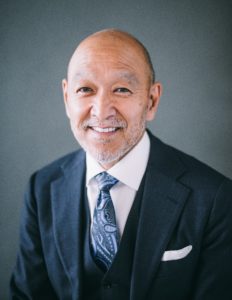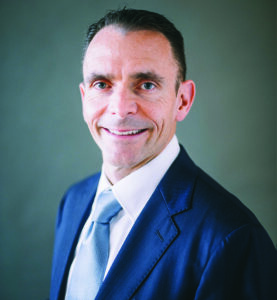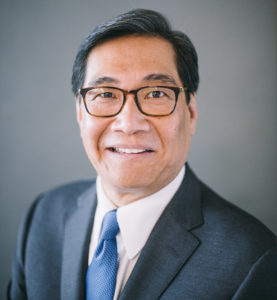By Phil Neuffer
Led by industry veterans Mark Okada, Jack Yang and Trey Parker, Sycamore Tree Capital Partners is an investment firm and asset manager taking the alternative credit space by storm.
New companies are not always led by new people. Such is the case with Sycamore Tree Capital Partners, an investment firm and asset manager specializing in private and alternative credit. The firm, which launched near the end of 2020, is led by three long-time industry veterans: Mark Okada, Jack Yang and Trey Parker. Okada and Yang both boast more than 35 years of experience in alternative credit investment, while Parker has been at it for more than two decades. All three have worked for some of the most prominent firms in the alternative credit space, with all three first coming together while working at Highland Capital Management.

Co-Founder & CEO
Sycamore Tree Capital Partners
With so much experience on their side, Okada, Yang and Parker can easily see shifts in the marketplace before they even begin, which was part of the reason they decided to start their own firm. On some level, however, the decision was built on a desire to do something new. “We saw an opportunity to combine the executive team’s deep expertise and previous experience building several other firms with a ‘clean piece of paper,’” Yang, who serves as Sycamore Tree Capital Partners’ president and head of business development, says. “With no legacy constraints, we are solely focused on building a high quality, scalable firm that is relevant to today’s markets.”
One of the benefits of having an executive team with so much experience is knowing what to prioritize from the outset, something Sycamore Tree Capital Partners has benefited from, with capital preservation at the heart of the firm’s approach, according to Yang.
“Our decades of experience and lessons learned along the way are highly valuable. The entire executive team understands the importance of capital preservation as a foundation of strong performance across market cycles for the benefit of both debt and equity investors,” Yang says. “Our respect and trust for each other has only grown. We have different yet complementary skills and personalities while sharing a common vision for the firm.”
Relying on experience has also been critical to Sycamore Tree Capital Partners’ hiring strategy. For example, last September, the firm brought on Paul Travers, a 38-year veteran, as a managing director and portfolio manager. Travers is helming the firm’s collateralized loan obligation strategy on both the origination and management side, something he has ample experience in after building Onex Credit Partners’ U.S. CLO platform to approximately $10 billion, growing DiMaio Ahmad Capital’s CLO business to more than $2.5 billion and managing Crédit Agricole’s CLO and collateralized bond obligation business in previous roles.

Co-Founder & Chief Investment Officer
Sycamore Tree Capital
CLOs ASAP
Although Sycamore Tree Capital Partners is taking a multi-strategy investment approach, CLOs serve as one of its pillars.
“CLOs are a core competency and cornerstone of Sycamore Tree Capital Partners,” Yang says. “We intend to be a consistent issuer of our own CLOs alongside investing in the bonds and equity of other managers as well.”
Once the firm added Travers, it was able to accelerate its CLO initiatives, leading to the close of its first CLO, Sycamore Tree CLO 2021-1, Ltd., at $403.3 million in November of 2021. With a five-year investment period, the CLO consists of an actively managed portfolio of syndicated loans issued by companies in the United States.
“That was an important proof-of-concept for Sycamore Tree,” Yang says. “Despite being a new brand, we were able to deliver sourcing and portfolio construction as a highly experienced manager. The CLO received strong interest across Wall Street’s underwriter and investor communities.”
Protecting Capital
To ensure it is adhering to what Yang calls the company’s “value-oriented investment philosophy,” Sycamore Tree Capital Partners is concentrating on more than just CLOs. In addition, the firm employs four other primary strategies, including high-grade CLO bonds, syndicated bank loans, credit opportunities and CLO equity. For its CLO bonds, it looks for AA risk with a floating rate target return of SOFR plus 200 basis points. For syndicated loans, it looks for credits with a floating rate return target of SOFR plus 400 basis points. Its credit opportunities run between BB and B credits with a return target between 8% and 10%. Lastly, its CLO equity strategy targets returns in the low-to-mid teens.
“Our key focus is capital preservation and identifying value opportunities that can generate attractive risk-adjusted returns for our investors,” Yang says. “Our focus is on strong execution and protection of capital so that our credit strategies can continue delivering attractive returns versus most other markets.”
Although it has quickly built a diverse range of investment strategies, Sycamore Tree Capital Partners doesn’t just rely on variety to differentiate itself in the market. Once again, this is where the experience of its leadership team comes into play.

Co-Founder & President
Sycamore Tree Capital Partners
“Our key differentiators include deep experience across market cycles, broad expertise in the full range of credit investing and prior experience serving an extensive group of institutional investors,” Yang says. “We are also one of the few diversely-owned and led firms in the credit space and have strong track records as innovators, solutions providers and partners to borrowers and banks.”
Yang also says the firm has a clear approach when it comes to both risk assessment and portfolio management. For the former, the firm employs what Yang describes as a “rigorous bottom-up credit analysis that includes fundamental research, relative value and credit monitoring … combined with a top down macro overlay.” The firm conducts this process iteratively and it’s one the company’s leaders have been refining for three decades. On the portfolio management side, Yang says the company’s intense focus on capital preservation and identifying value opportunities is what allows it to traverse the asymmetric risk and return profile of debt investing.In addition, the firm, which became a signatory of the United Nations-backed Principles for Responsible Investment in its first year in business, incorporates environmental, social and governance factor analysis and scoring systems into its standard credit research process.
Seeds of Growth
For a company that launched near the beginning of the COVID-19 pandemic, Sycamore Tree Capital Partners has weathered the storms of its first year and a half in business very well, according to Yang, who says the market has yielded attractive investment opportunities in response to a market reset following a recessionary dip during the pandemic.
“The first 18 months have been very encouraging,” Yang says. “Our existing relationships with investors and intermediaries have been, and continue to be, key to our success as a new firm.”
Sycamore Tree Capital Partners grew its balance sheet to include $800 million in assets under management by the end of its first year and Yang says it expects to reach more than $1.5 billion in AUM before 2022 comes to a close. In addition, the firm plans to launch two additional floating rate strategies in July while growing its team to 22 people, with nearly 50% of those professionals coming from groups who are underrepresented in the industry. The firm is also expanding geographically, having opened a New York office in January of 2022.
“Opening a second office location in New York City was always part of our growth plan,” Yang says. “It offers unparalleled connectivity across the credit market and investor communities.”
Since it hasn’t reached its second anniversary, Sycamore Tree Capital Partners is still in its “early stages,” according to Yang, but that doesn’t mean its leadership team isn’t thinking about the long term, with the firm identifying special situations and private debt as two potential expansion areas once it scales further.
“Our long-term goal is to build a firm that combines the size and scale required to meet the needs of large institutional investors with a tight-knit culture of client service,” Yang says. “To accomplish this, we’re focused on hiring exceptional talent and continuing to align our interests with those of our clients.” •
